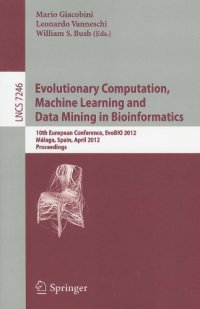
Ebook: Evolutionary Computation, Machine Learning and Data Mining in Bioinformatics: 10th European Conference, EvoBIO 2012, Málaga, Spain, April 11-13, 2012. Proceedings
- Tags: Computational Biology/Bioinformatics, Algorithm Analysis and Problem Complexity, Database Management, Artificial Intelligence (incl. Robotics), Computation by Abstract Devices, Data Structures
- Series: Lecture Notes in Computer Science 7246 Theoretical Computer Science and General Issues
- Year: 2012
- Publisher: Springer-Verlag Berlin Heidelberg
- City: Berlin ; New York
- Edition: 1
- Language: English
- pdf
This book constitutes the refereed proceedings of the 10th European Conference on Evolutionary Computation, Machine Learning and Data Mining in Bioinformatics, EvoBIO 2012, held in Málaga, Spain, in April 2012 co-located with the Evo* 2012 events.
The 15 revised full papers presented together with 8 poster papers were carefully reviewed and selected from numerous submissions. Computational Biology is a wide and varied discipline, incorporating aspects of statistical analysis, data structure and algorithm design, machine learning, and mathematical modeling toward the processing and improved understanding of biological data. Experimentalists now routinely generate new information on such a massive scale that the techniques of computer science are needed to establish any meaningful result. As a consequence, biologists now face the challenges of algorithmic complexity and tractability, and combinatorial explosion when conducting even basic analyses.
This book constitutes the refereed proceedings of the 10th European Conference on Evolutionary Computation, Machine Learning and Data Mining in Bioinformatics, EvoBIO 2012, held in Málaga, Spain, in April 2012 co-located with the Evo* 2012 events. The 15 revised full papers presented together with 8 poster papers were carefully reviewed and selected from numerous submissions. Computational Biology is a wide and varied discipline, incorporating aspects of statistical analysis, data structure and algorithm design, machine learning, and mathematical modeling toward the processing and improved understanding of biological data. Experimentalists now routinely generate new information on such a massive scale that the techniques of computer science are needed to establish any meaningful result. As a consequence, biologists now face the challenges of algorithmic complexity and tractability, and combinatorial explosion when conducting even basic analyses